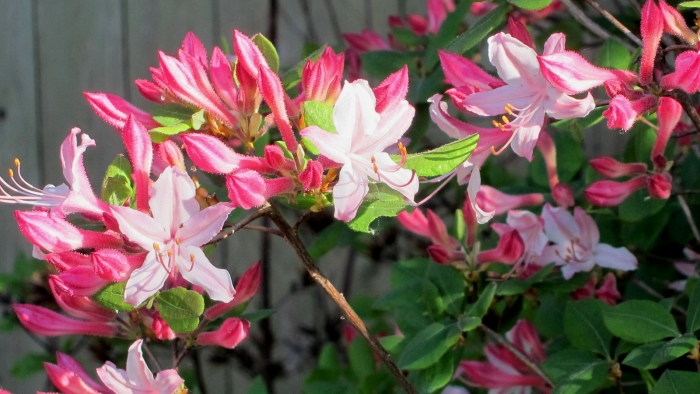Coastal Azalea
(Rhododendron atlanticum)
Coastal Azalea (Rhododendron atlanticum)
/
/

cultivar413
CC BY 2.0
Image By:
cultivar413
Recorded By:
Copyright:
CC BY 2.0
Copyright Notice:
Photo by: cultivar413 | License Type: CC BY 2.0 | License URL: https://creativecommons.org/licenses/by-sa/2.0/ | Uploader: cultivar413 | Publisher: Flickr |

















Estimated Native Range
Summary
Rhododendron atlanticum, commonly known as Coastal Azalea, is a deciduous shrub native to the coastal plain regions, including pine barrens, bogs, and savannahs in the Eastern United States. It typically grows to 50–150 cm (20–59 in) tall and can form dense thickets in the wild by spreading through underground stolons. The leaves are 3–5 cm long and 1–2 cm broad, bluish-green, and may be hairless or have scattered glandular hairs. The fragrant flowers, which bloom in late spring to early summer, are 3–4 cm long and usually white to pink, occasionally with a yellow tinge, and are produced in clusters of 4-10. The flowers are notably showy and attract a variety of pollinators.
Coastal Azalea is valued for its fragrant, showy flowers and its ability to form a dense ground cover, making it suitable for mass plantings in woodland gardens, naturalized areas, or as a border shrub. It thrives in part shade but can tolerate full sun in cooler climates if kept moist. It requires acidic, well-drained soils and benefits from a layer of mulch to retain soil moisture. While generally low-maintenance, it can be susceptible to pests such as azalea lace bugs and diseases like root rot if drainage is poor. It is not known for aggressive roots or significant invasiveness, but it should be monitored to ensure it does not spread beyond desired areas in the garden.CC BY-SA 4.0
Coastal Azalea is valued for its fragrant, showy flowers and its ability to form a dense ground cover, making it suitable for mass plantings in woodland gardens, naturalized areas, or as a border shrub. It thrives in part shade but can tolerate full sun in cooler climates if kept moist. It requires acidic, well-drained soils and benefits from a layer of mulch to retain soil moisture. While generally low-maintenance, it can be susceptible to pests such as azalea lace bugs and diseases like root rot if drainage is poor. It is not known for aggressive roots or significant invasiveness, but it should be monitored to ensure it does not spread beyond desired areas in the garden.CC BY-SA 4.0
Plant Description
- Plant Type: Shrub
- Height: 2-5 feet
- Width: 2-5 feet
- Growth Rate: Moderate
- Flower Color: Pink, White
- Flowering Season: Spring
- Leaf Retention: Deciduous
Growth Requirements
- Sun: Part Shade
- Water: Medium
- Drainage: Fast
Common Uses
Bee Garden, Bird Garden, Border Plant, Butterfly Garden, Fragrant, Hummingbird Garden, Low Maintenance, Potted Plant, Rabbit Resistant, Showy Flowers
Natural Habitat
Native to pine barrens, bogs, and savannahs in the coastal plain regions of the Eastern United States
Other Names
Common Names: Dwarf Azalea, Coastal Azalea, Kustazalea
Scientific Names: , Rhododendron atlanticum, Azalea atlantica, Rhododendron atlanticum f. tomolobum, Azalea neglecta, Rhododendron atlanticum f. confusum, Azalea atlantica var. luteoalba, Rhododendron atlanticum f. atlanticum, Rhododendron atlanticum f. luteoalbum, Rhododendron atlanticum f. neglectum
GBIF Accepted Name: Rhododendron atlanticum (Ashe) Rehder